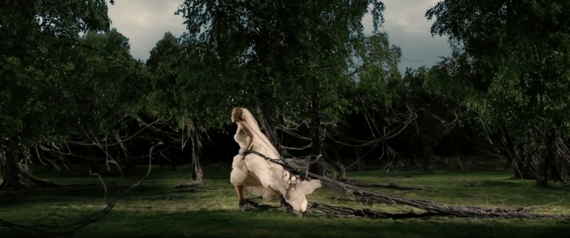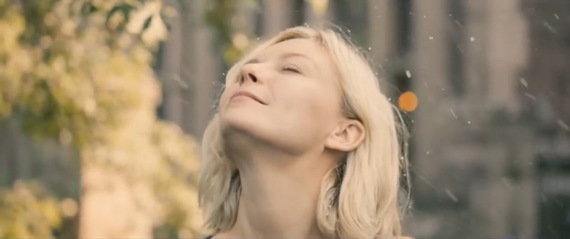
Image is screenshot from film "Melancholia"
When listening to Brian Wilson's "God Only Knows," reading a Virginia Woolf novel or learning Charles Darwin's theory of evolution, you might think of individuals who have stretched the boundaries of what humans are capable of in this life.
For such works, it's easy to put their creators on a very distant shelf, far away from the every day. These people were geniuses, after all. They had higher IQs, unworldly talents and fate lined up in their pockets. Didn't they?
But while these highly creative individuals have mothered lasting discoveries and creations, what is less noted may be their struggle behind closed doors.
The supposed link between creativity and mental illness has been studied and discussed and studied more -- I am not treading on untouched ground here. But the "how" remains less clear as well as the strengths that exist with having to emotionally tread through water when others seem to glide. But can there possibly be an upside to such a real and crippling struggle?
The Weakness of Strength theory, as explained by the School of Life, suggests that people's weaknesses are the inevitable downside of their strengths.
"What we're seeing are not their faults, pure and simple, rather, the shadow side of things that are genuinely good about them," the video briefs. "We're picking up on weaknesses that derive from strengths."
Can this theory be applied to mental illness? Let's use the earlier example of Darwin, author of "On the Origin of Species," who suffered from depression.
"I shall probably do little more but be content to admire the strides others made in Science," quoted the mind behind the theory of evolution. Darwin's depression at times disabled his mind. But the need to fight harder to move forward even by an inch may have been the spark that got him to act beyond his depression.
A New York Times article titled "Depression's Upside" honed in on Darwin's depression and on his fear of never being able to come up with a noteworthy discovery.
"Darwin, of course, was wrong; his recurring fits didn't prevent him from succeeding in science. Instead, the pain may actually have accelerated the pace of his research, allowing him to withdraw from the world and concentrate entirely on his work," the article read. "For Darwin, depression was a clarifying force, focusing the mind on its most essential problems."
A common theme with anxiety, depression or any mental illness is an ever-present void -- a thirst for more than what's presently at hand. Often times, to the depressed or to those who struggle with mental illness, the most menial of tasks can trigger existential episodes seemingly bigger than the actual issue.
This is seen in Lars von Trier's "Melancholia," a movie that offers a fresh cinematic depiction of depression.
"Melancholia" begins with a montage of slow motion clips, including a bride and a massive planet approaching Earth, giving away the film's ending. For a more thorough look at "Melancholia," watch Evan Puschak's "Depression on Film."
Von Trier himself suffers from depression, which may explain the purpose of the slow motion clips at the start of the film, as a warped sense of time is often a shared experienced for those who are depressed. On top of being very ascetically beautiful, in relation to the plot, the clips metaphorically show the bride Justine's -- and von Trier's -- depression, juxtaposed against the end of the world.
The storyline of the movie is worth more than the explanation I'm about to give, but in essence, the movie continues with Justine and her new husband arriving late to their own reception.
Throughout the party, Justine begins to fall deeper and deeper into a bout of depression. Closer to the end of the party and then moving on after, Justine struggles with small tasks -- at one point, even needing assistance with bathing.
Going back to the massive planet, as life continues after the failed reception (Justine had left her just-married husband), the characters learn that the rogue planet Melancholia will eventually collide with Earth. Justine's sister -- who seemingly had her life together and who chastised Justine as she fell apart at the reception -- begins to lose her cool at this realization, as many would. Justine, however, does not.
In the face of the every day and the menial, Justine panicked. But in the face of the existential threat of Earth being destroyed, Justine was calm and at peace. Perhaps to the depressive, the day to day, the ordinary or the routine is scattered with existential crises, while those not struggling mentally or emotionally rarely go down that route.
This, to me, is where the strongest connection stands with the link between creativity and mental illness: comfortability and familiarity with the most trying existential questions. Why are we here? Do I exist? Do I matter? Does life even matter? It can be argued that art and discovery are the closest means we have to answering these questions. Where would the most long-lasting art be without those who have questioned what the meaning of all of this is?
"In my view, depression is what happens when your identity, that sense of the relationship you have with the world around you, becomes untethered -- unfocused. In this process, everything starts to screw. Time slows to a standstill. Your body, once so easy to move feels like it weighs a ton," Puschak said, who runs the YouTube channel Nerdwriter. "As it stands, science and medicine have come up short in their apprehension of mental illness. So maybe we ought to look to art for insights and solidarity about what it's like living a life out of proportion."
Granted, each person's experience with mental illness is subjective. Although, as a society, we tend to most often discuss mental illness in catastrophic circumstances. But while we are very familiar with the downsides of mental illness, especially as of late, we do need our artists and we do need the minds who see what is missing or wrong with the world. This, of course, does not mean that you can't be an artist or struggle with life's existential problems if you are mentally well. I'm just trying to shine light on the positive sides of a very real problem in a world that most often discusses mental illness in relation to serial killers and suicides.
But at the end of this thought, it's important to note that this is, merely, a thought. I'm just a blogger scribbling down my ideas somewhere in the world, making generalizations as we all do, as I try to pin my mind back down to Earth, thinking to myself: Why are we here? Do I exist? Does this post even matter?
This summer I'm setting off on a street performing tour of the United States. Follow along here.
